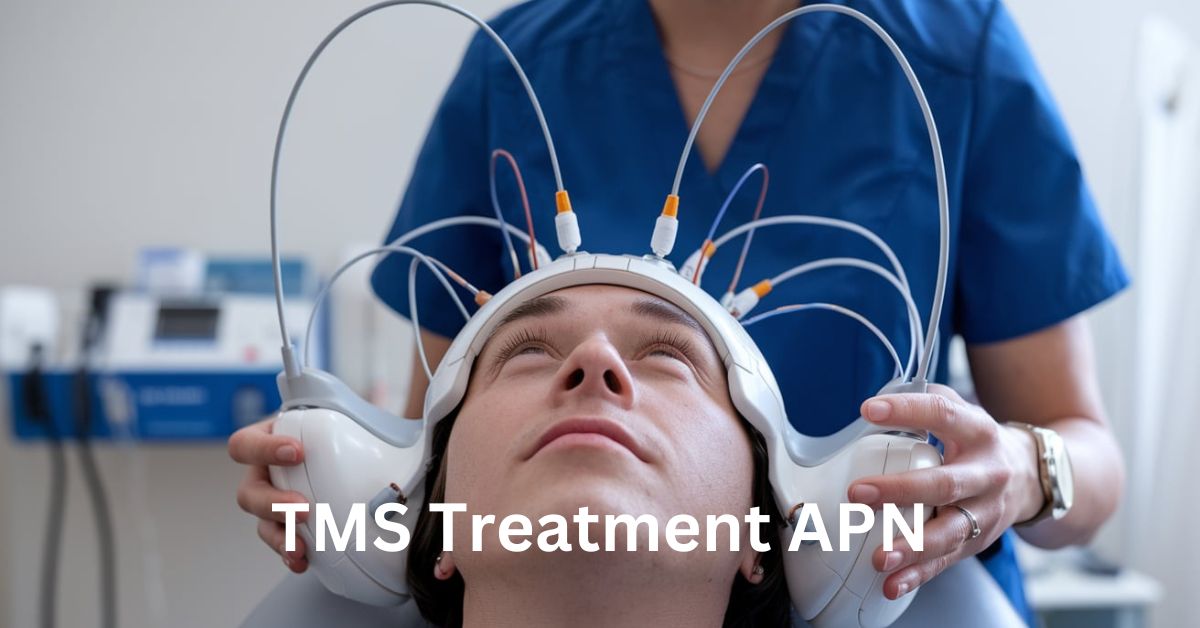Comprehensive Guide to TMS Treatment APN: Everything You Need to Know
Transcranial Magnetic Stimulation (TMS) therapy has revolutionized the way mental health conditions like depression and anxiety are treated. While traditional treatments such as medication and therapy work for many, some individuals need an alternative. TMS treatment, especially Advanced Practice Nurse (APN)-guided TMS, is proving to be an effective solution. In this article, we will explore “TMS treatment APN,” its benefits, procedures, and much more.
This guide will not only explain the science behind TMS but also provide unique insights and interpretations that go beyond the basics. By the end, you’ll understand why this treatment is a game-changer for individuals in the USA looking for a different approach to managing mental health.
What is TMS Treatment?
TMS (Transcranial Magnetic Stimulation) is a non-invasive procedure that uses magnetic fields to stimulate nerve cells in the brain. Primarily used for treating depression, it has also shown success in managing other mental health conditions like Obsessive-Compulsive Disorder (OCD) and anxious depression.
During a TMS session, magnetic pulses are directed at specific areas of the brain that are underactive in patients with depression. These pulses help to “wake up” the brain, encouraging the regions to function more normally. This form of brain stimulation can offer relief to those who haven’t responded well to traditional treatments.
Understanding APN and Their Role in TMS Treatment
APNs (Advanced Practice Nurses) are highly trained healthcare professionals who can diagnose and treat medical conditions, often in collaboration with doctors. In the context of TMS treatment, an APN’s role is critical in ensuring the procedure is performed safely and effectively.
The keyword “TMS treatment APN” specifically refers to TMS therapy that is administered under the guidance and supervision of an Advanced Practice Nurse. In the USA, where the demand for mental health treatment is growing, the involvement of APNs has helped make TMS more accessible.
Why an APN for TMS Treatment?
- Expert Knowledge: APNs have advanced training in patient care, mental health, and therapeutic treatments, which makes them highly skilled at administering TMS.
- Personalized Care: APNs can evaluate each patient’s condition, tailor the TMS sessions accordingly, and adjust as necessary.
- Accessible Healthcare: In rural or underserved areas, APNs often serve as primary healthcare providers, ensuring that even individuals in these regions have access to treatments like TMS.
How Does TMS Treatment Work?
TMS is relatively straightforward but highly effective. Here’s how the process typically unfolds:
- Initial Assessment: A healthcare provider, often an APN, will evaluate the patient’s mental health condition. This may involve diagnostic questionnaires, a review of past treatments, and a general health checkup.
- Mapping the Brain: During the first session, the technician will identify the right area of the brain to target, which is typically the prefrontal cortex, associated with mood regulation.
- Magnetic Pulses: Magnetic coils are placed near the patient’s scalp, and magnetic pulses are delivered. The patient is fully awake and can communicate throughout the session.
- Session Duration: Each session lasts between 20 and 40 minutes, and patients typically need multiple sessions over the course of several weeks for the treatment to be effective.
- Post-Session Care: After each session, the APN will assess the patient’s response to the treatment and make necessary adjustments.
Is TMS Painful?
TMS is non-invasive, and for most patients, the treatment is painless. Some patients might experience a mild tapping sensation or slight discomfort during the session, but it generally subsides after the first few treatments.
The Conditions Treated by TMS
TMS has been approved by the FDA for the treatment of Major Depressive Disorder (MDD). However, its use has expanded to include other mental health conditions. Let’s explore some of the primary conditions that can benefit from TMS treatment under the care of an APN.
1. Major Depressive Disorder (MDD)
MDD is one of the most common mental health disorders, affecting millions of individuals in the USA. TMS has been shown to improve symptoms in patients who have not responded well to antidepressants. This makes TMS an excellent option for those looking for alternatives to medication.
2. Obsessive-Compulsive Disorder (OCD)
OCD involves intrusive thoughts and repetitive behaviors, which can significantly interfere with daily life. TMS helps by targeting brain circuits related to obsessive-compulsive behaviors, offering a new treatment avenue for patients who don’t see results with standard therapy.
3. Anxious Depression
Some individuals suffer from a combination of anxiety and depression, which can make treatment more challenging. TMS therapy helps to alleviate both anxiety and depression by rebalancing brain activity in key regions.
4. PTSD (Post-Traumatic Stress Disorder)
Emerging research shows that TMS may be useful for patients with PTSD by calming overactive areas of the brain involved in the trauma response. This can help reduce flashbacks, hypervigilance, and emotional numbness.
Benefits of TMS Treatment APN
What makes TMS treatment, especially when administered by an APN, stand out from other forms of therapy? Here are some key benefits:
1. Non-Invasive
Unlike medications that can cause a host of side effects or treatments that require surgical intervention, TMS is non-invasive. This means no anesthesia, no incisions, and no downtime.
2. Minimal Side Effects
The side effects associated with TMS are mild, with the most common being slight discomfort at the treatment site or a headache. These side effects are usually temporary and fade as treatment progresses.
3. High Success Rates
Many patients who don’t respond to antidepressants find relief from their symptoms through TMS. The ability to tailor the treatment to each individual under the care of an APN adds another layer of effectiveness.
4. FDA-Approved
TMS is FDA-approved for treating conditions like depression and OCD, giving it credibility and making it more accessible to patients across the USA.
5. Customized Care
The involvement of an APN ensures that the treatment is adapted to each patient’s unique needs. APNs can adjust the intensity, frequency, and duration of TMS sessions to provide the best outcomes.
TMS Treatment Process Under APN Guidance
The TMS treatment process under an APN includes several stages, each crucial to achieving the best outcomes. Here’s a detailed look at how a typical treatment unfolds:
1. Consultation
Before starting TMS, the APN will have an in-depth consultation with the patient. This consultation includes:
- A review of the patient’s mental health history.
- Discussing past treatments and their outcomes.
- Evaluating the patient’s suitability for TMS.
2. Developing a Treatment Plan
After the initial assessment, the APN will create a personalized TMS treatment plan. The plan includes details like the number of sessions, the area of the brain to be targeted, and the intensity of the magnetic pulses.
3. Continuous Monitoring
Throughout the treatment, the APN monitors the patient’s response to TMS, adjusting the therapy as necessary. Continuous monitoring ensures that the treatment is both safe and effective.
4. Follow-Up
Even after the completion of TMS therapy, the APN will continue to follow up with the patient. This follow-up includes mental health assessments, additional therapies if needed, and long-term care planning.
TMS vs. Traditional Depression Treatments
When comparing TMS treatment APN with more traditional depression treatments like medications and talk therapy, there are some significant differences. Let’s break them down:
1. Medications
- Pros: Easy to take, work well for many individuals.
- Cons: Side effects can be significant, including weight gain, sexual dysfunction, and insomnia. Some patients also experience a delayed response, waiting weeks or months for relief.
2. Talk Therapy
- Pros: Provides long-term coping strategies and emotional support. It is effective for mild to moderate depression.
- Cons: Results can be slow, and it may not be enough on its own for individuals with severe depression or treatment-resistant depression.
3. TMS
- Pros: Non-invasive, minimal side effects, quick results (sometimes within a few weeks), and high success rates, especially in patients who haven’t responded to other treatments.
- Cons: Time commitment (requires daily sessions for several weeks) and is typically more expensive than medications or talk therapy.
How to Prepare for TMS Treatment
If you’re considering TMS treatment under the guidance of an APN, here’s how you can prepare:
- Understand Your Condition: Make sure you fully understand your diagnosis and the potential benefits of TMS.
- Discuss Medications: Let your healthcare provider know about any medications you’re currently taking. You may need to adjust them before starting treatment.
- Plan Your Schedule: TMS requires multiple sessions, typically five days a week for several weeks. Make sure you have the time in your schedule to commit to these appointments.
- Mental Preparation: While TMS is non-invasive, it’s still important to mentally prepare for the treatment process. Stay positive and maintain open communication with your APN about how you’re feeling during the sessions.
The Cost of TMS Treatment APN
One of the common questions people ask is, “How much does TMS treatment cost?” While costs vary, here are some general insights:
- Insurance Coverage: Most insurance providers in the USA now cover TMS for the treatment of depression, especially if other treatments haven’t worked.
- Out-of-Pocket Expenses: Without insurance, TMS can cost anywhere from $300 to $500 per session, with full treatment costing between $6,000 and $12,000. However, the cost is often outweighed by the benefits of living a depression-free life.
Success Stories and Testimonials
Many individuals who have undergone TMS treatment under the supervision of an APN have shared positive testimonials. From overcoming years of depression to finally managing OCD symptoms, the real-life stories of patients highlight the profound impact of TMS.
Here are a few examples:
- John, 42: After battling depression for over a decade, John found TMS to be life-changing. He says, “Nothing else worked for me. I was skeptical at first, but within a few weeks, I noticed a real difference. I finally have my life back.”
- Sarah, 30: Diagnosed with OCD, Sarah tried multiple treatments before TMS. “It wasn’t until I started TMS that I began to feel like myself again. The APN guiding my sessions made all the difference.”
FAQs About TMS Treatment APN
1. What is TMS treatment APN? TMS treatment APN refers to Transcranial Magnetic Stimulation therapy administered under the supervision of an Advanced Practice Nurse. This ensures high-quality, personalized care during the treatment.
2. How long does TMS treatment take? Typically, TMS treatment requires about 20-40 sessions, conducted five days a week over 4-6 weeks. Each session lasts about 20-40 minutes.
3. Does insurance cover TMS treatment? Yes, many insurance companies in the USA now cover TMS, especially for patients with treatment-resistant depression.
4. Are there any risks involved? TMS is generally safe, with the most common side effects being mild headaches or discomfort at the treatment site. Serious side effects are rare.
5. How do I know if TMS treatment is right for me? If you have depression, OCD, or another mental health condition and have not responded well to other treatments, you may be a good candidate for TMS. Consult an APN for an evaluation.
Conclusion
“TMS treatment APN” offers hope for individuals who have struggled to find relief from depression and other mental health conditions through traditional treatments. With its non-invasive nature, minimal side effects, and growing success rates, TMS treatment under the guidance of an Advanced Practice Nurse can be life-changing.
If you’re considering TMS, speak with an APN to discuss whether this therapy might be the right option for you. With careful monitoring, personalized care, and a commitment to mental health, you can find the relief you’ve been searching for.






